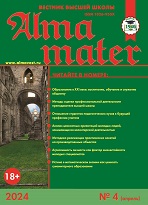UDC 327+378(470+571+98)
https://doi.org/10.20339/AM.11-19.023
E.V. Kudryashova is Dr.Sci. (Philosophy), prof., rector of university e-mail: e.kudryashova@narfu.ru; and L.A. Zarubina is PhD student, deputy vice-rector for International cooperation e-mail: l.zarubina@narfu.ru at Northern (Arctic) Federal University n.a. M.V. Lomonosov
Researched is the process of transformation to a new model of society, based on knowledge, innovation and high technologies. Development of intellectual potential of Russia and systemic work with talented young people is one of key factors of ensuring innovative advancement of national economy, it’s competitiveness and contribution to addressing global challenges. Under the given conditions, facilitation of international scientific partnership, academic mobility and integration into international know-how global exchange become essential in development of the country and its transition to new technological model. Russian universities acting as one of the main subjects of international research collaboration and channels of knowledge and technology transfer are searching for effective educational approaches and models of training young scholars for technologies of the future. The article underlines necessity to take into account international dimension and obtaining experience of international cooperation in training young scholars, that is presupposed by complexity and interdisciplinary of modern research, creation of international scientific networks, intensifying mobility of researchers, development of digital technologies and global accessibility of research results. The article presents practices of introducing various tools of international cooperation aimed at integrating students and young researchers into global scientific environment by means of providing access to world knowledge and technologies and developing international competences. In particular, the authors provide the case of the Northern (Arctic) Federal University n.a. M.V. Lomonosov and address specific features and challenges of enhancing international cooperation in the Arctic Region.
Key words: international cooperation, training young scholars, academic mobility, Arctic Region.
References
1. Deriglazova, L.V., Karateva, I.Yu. Analysis of factors of participation in programs of international academic mobility on the example of some universities of the Siberian Federal District. Vestnik mezhdunarodnykh organizatsii: obrazovanie, nauka, novaya ekonomika. 2007. No. 2. P. 12–33.
2. Varlamova, A.V. Academic mobility of Russian HE students (case study: Russian state university of tourism and service). Vestnik Assotsiatsii vuzov turizma i servisa. 2014. No. 1. P. 74–80.
3. Ignatushchenko, E.I., Redina, Yu.N. International scientific and technical cooperation of national universities as a mechanism to increase the innovation complex of the economy. Molodoi uchenyi. 2016. No. 29. P. 407–417.
4. Knyaginina, N., Yanbarisova, D. Support for talented youth: the experience of Russia and foreign countries. Obrazovatel'naya politika. 2016. No. 1 (71).
5. Popova, L.V., Zakharova, N.S. University Gifted Education Support Programs. Psikhologicheskaya nauka i obrazovanie. 2011. No. 4. P. 46–55.
6. Kalinina, M.R., Zarubina, L.A. International Arctic Cooperation: Experience of the Northern (Arctic) Federal University n.a. M.V. Lomonosov. Arkticheskie vedomosti. 2015. No. 3 (14). P. 92–97.
7. Sundet, M., Forstorp, P.-A., Örtenbladby, A. Higher Education in the High North: Academic Exchanges between Norway and Russia. Higher education dynamics. Vol. 48. P. 47–63.
8. Wiers-Jenssen, J. Student mobility and the professional value of higher education from abroad. Oslo, 2008.
9. Cooperation in the Barents Euro-Arctic region in the field of education and science as a source of regional development. Arkhangelsk, 2013.
10. Sorokina, T.Yu. Biological monitoring in the Arctic as an interdisciplinary project. In: Biomonitoring v Arktike. Arkhangelsk, 2018.
11. Drachkova, L.N., Zaikov, K.S. Arctic Floating University: Yesterday, Today, Tomorrow. Vestnik Severnogo (Arkticheskogo) federal'nogo universiteta. 2016. No. 4. P. 87–89.
12. Avdonina, N.S., Kudryashova, E.V. & Zaikov, K.S. Terrae Novae: the tenth scientific and educational expedition “Arctic Floating University”. The Polar Journal, 2019.
13. Education and science in Russia: state and potential of development. Moscow, 2017.
14. Kliot, Yu.M. The role of academic mobility in innovative development of quality management system. Vestnik TGPU. 2012. No. 1. P. 276–279.











.png)






